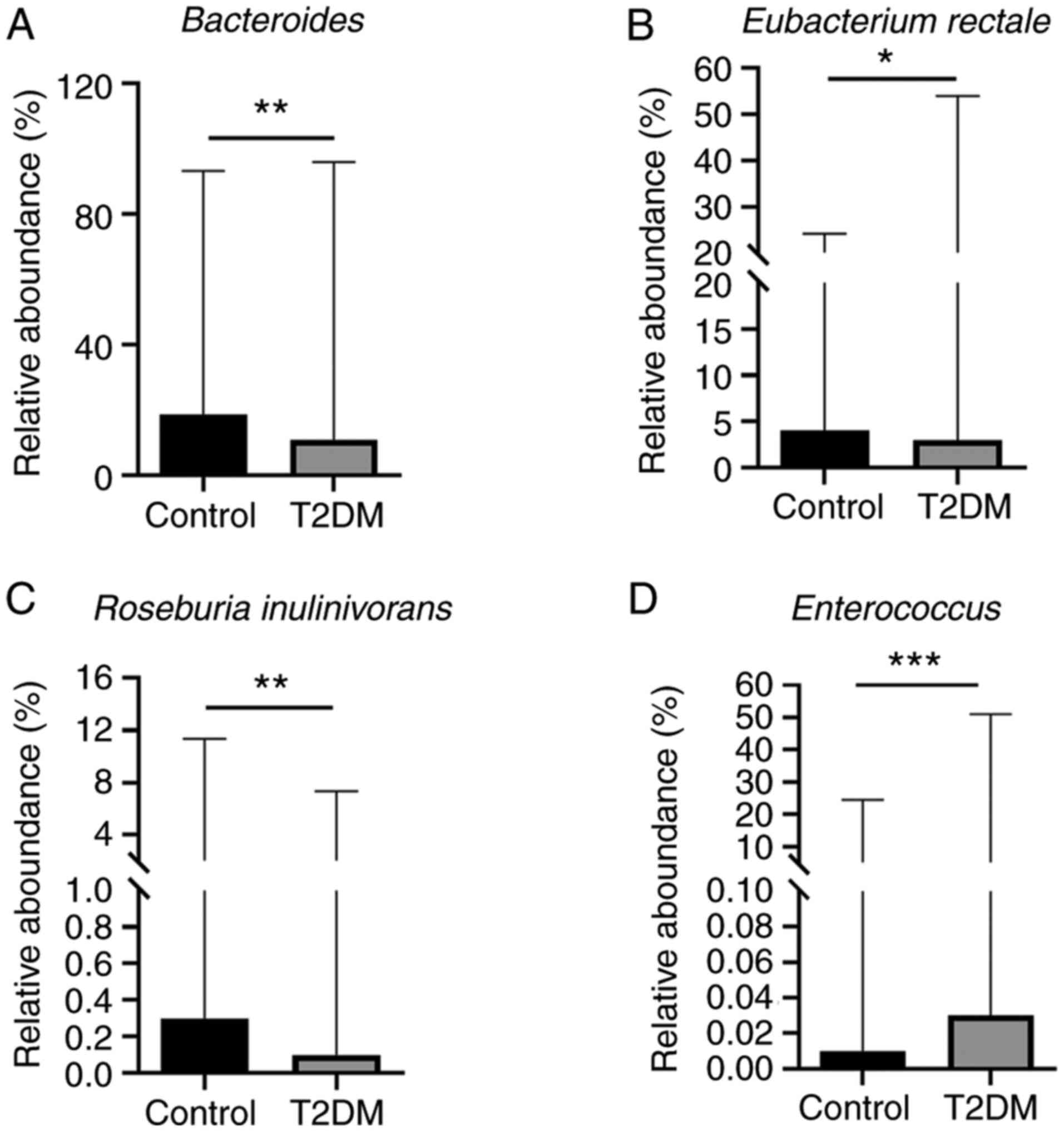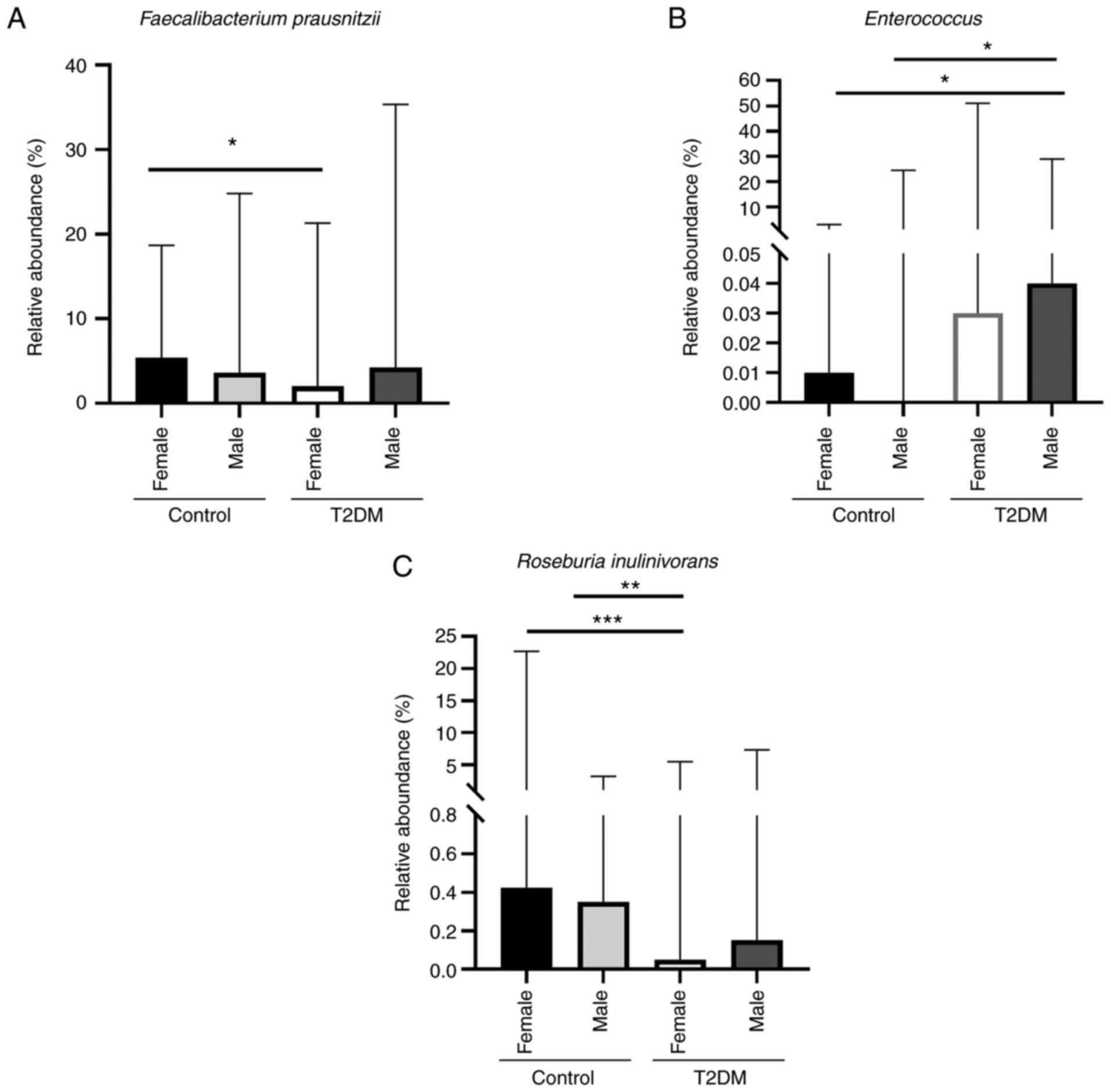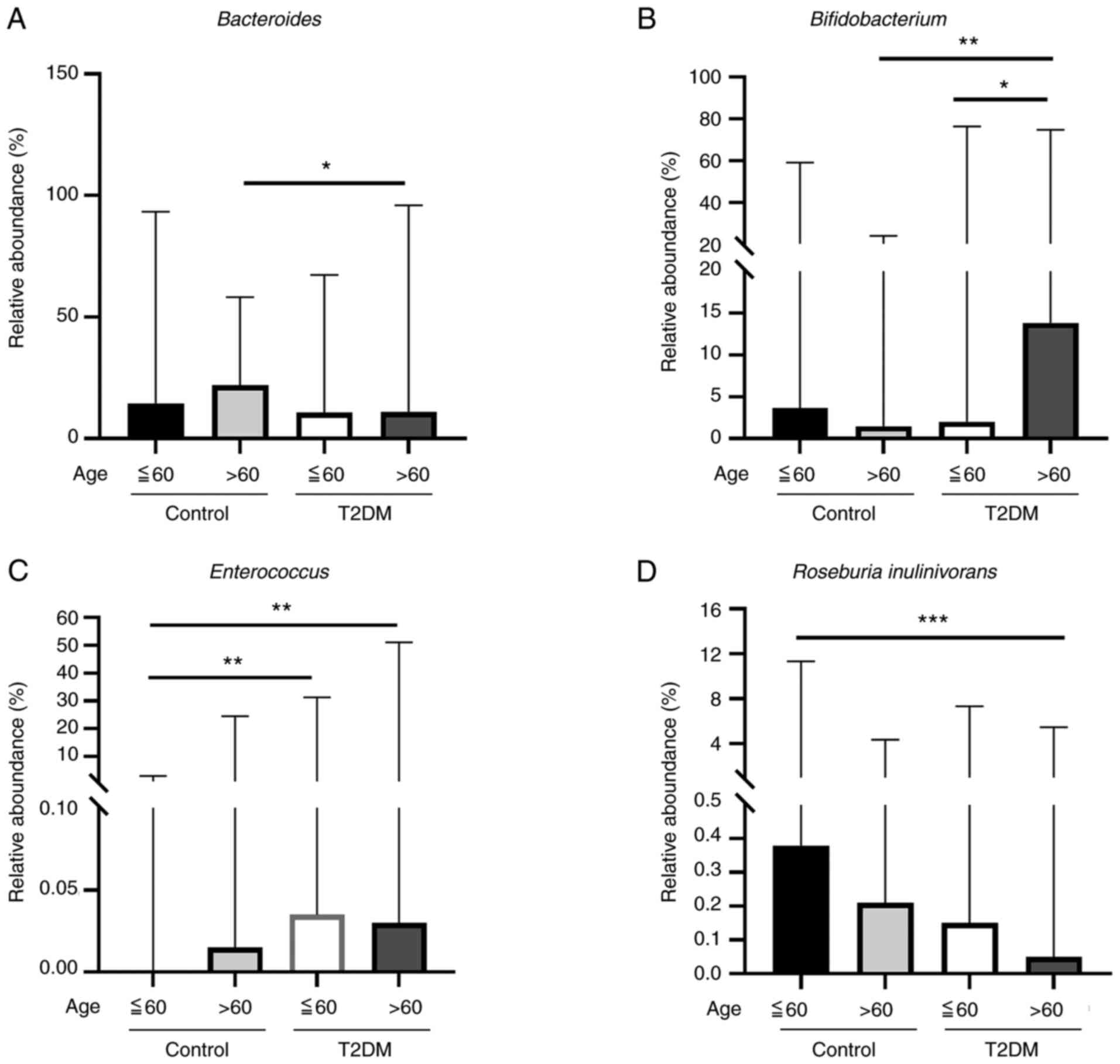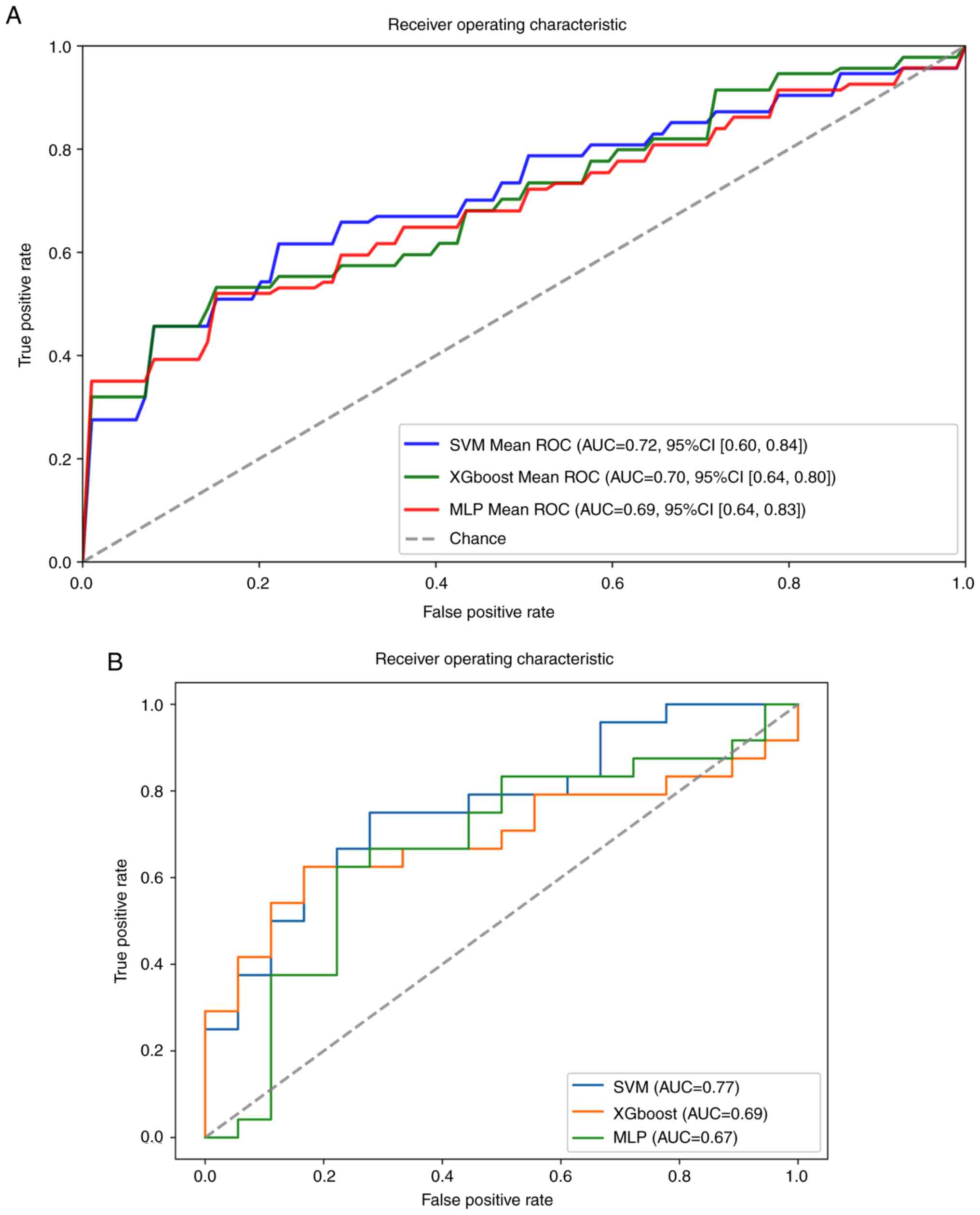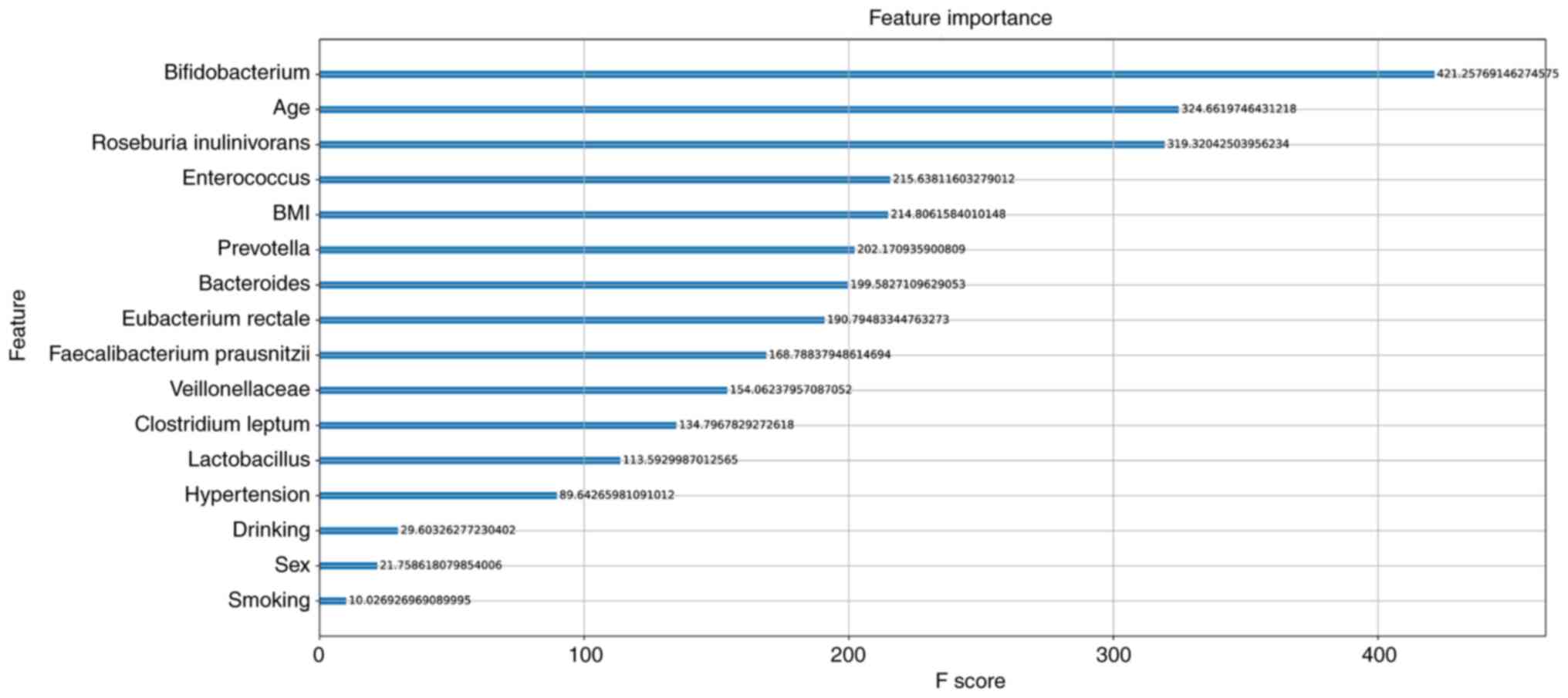|
1
|
Roden M and Shulman GI: The integrative
biology of type 2 diabetes. Nature. 576:51–60. 2019.PubMed/NCBI View Article : Google Scholar
|
|
2
|
Massey W and Brown JM: The gut microbial
endocrine organ in type 2 diabetes. Endocrinology.
162(bqaa235)2021.PubMed/NCBI View Article : Google Scholar
|
|
3
|
Hu C and Jia W: Diabetes in China:
Epidemiology and genetic risk factors and their clinical utility in
personalized medication. Diabetes. 67:3–11. 2018.PubMed/NCBI View Article : Google Scholar
|
|
4
|
Pavlou DI, Paschou SA, Anagnostis P,
Spartalis M, Spartalis E, Vryonidou A, Tentolouris N and Siasos G:
Hypertension in patients with type 2 diabetes mellitus: Targets and
management. Maturitas. 112:71–77. 2018.PubMed/NCBI View Article : Google Scholar
|
|
5
|
Colosia AD, Palencia R and Khan S:
Prevalence of hypertension and obesity in patients with type 2
diabetes mellitus in observational studies: A systematic literature
review. Diabetes Metab Syndr Obes. 6:327–338. 2013.PubMed/NCBI View Article : Google Scholar
|
|
6
|
Sabuncu T, Sonmez A, Eren MA, Sahin I,
Çorapçioğlu D, Üçler R, Akin Ş, Haymana C, Demirci İ, Atmaca A, et
al: Characteristics of patients with hypertension in a population
with type 2 diabetes mellitus. Results from the Turkish Nationwide
SurvEy of Glycemic and other metabolic parameters of patients with
diabetes mellitus (TEMD Hypertension Study). Prim Care Diabetes.
15:332–339. 2021.PubMed/NCBI View Article : Google Scholar
|
|
7
|
National high blood pressure education
program working group report on hypertension in diabetes.
Hypertension. 23:145–158; discussion 159-160. 1994.PubMed/NCBI
|
|
8
|
Baliunas DO, Taylor BJ, Irving H, Roerecke
M, Patra J, Mohapatra S and Rehm J: Alcohol as a risk factor for
type 2 diabetes: A systematic review and meta-analysis. Diabetes
Care. 32:2123–2132. 2009.PubMed/NCBI View Article : Google Scholar
|
|
9
|
Ezzati M and Riboli E: Behavioral and
dietary risk factors for noncommunicable diseases. N Engl J Med.
369:954–964. 2013.PubMed/NCBI View Article : Google Scholar
|
|
10
|
Powles JW, Zatonski W, Vander Hoorn S and
Ezzati M: The contribution of leading diseases and risk factors to
excess losses of healthy life in Eastern Europe: Burden of disease
study. BMC Public Health. 5(116)2005.PubMed/NCBI View Article : Google Scholar
|
|
11
|
Zhou H, Sun L, Zhang S, Zhao X, Gang X and
Wang G: Evaluating the causal role of gut microbiota in type 1
diabetes and its possible pathogenic mechanisms. Front Endocrinol
(Lausanne). 11(125)2020.PubMed/NCBI View Article : Google Scholar
|
|
12
|
Hasain Z, Mokhtar NM, Kamaruddin NA,
Mohamed Ismail NA, Razalli NH, Gnanou JV and Raja Ali RA: Gut
microbiota and gestational diabetes mellitus: A review of host-gut
microbiota interactions and their therapeutic potential. Front Cell
Infect Microbiol. 10(188)2020.PubMed/NCBI View Article : Google Scholar
|
|
13
|
Gilbert JA, Blaser MJ, Caporaso JG,
Jansson JK, Lynch SV and Knight R: Current understanding of the
human microbiome. Nat Med. 24:392–400. 2018.PubMed/NCBI View Article : Google Scholar
|
|
14
|
Takagi T, Naito Y, Inoue R, Kashiwagi S,
Uchiyama K, Mizushima K, Tsuchiya S, Dohi O, Yoshida N, Kamada K,
et al: Differences in gut microbiota associated with age, sex, and
stool consistency in healthy Japanese subjects. J Gastroenterol.
54:53–63. 2019.PubMed/NCBI View Article : Google Scholar
|
|
15
|
Pasolli E, Asnicar F, Manara S, Zolfo M,
Karcher N, Armanini F, Beghini F, Manghi P, Tett A, Ghensi P, et
al: Extensive unexplored human microbiome diversity revealed by
over 150,000 genomes from metagenomes spanning age, geography, and
lifestyle. Cell. 176:649–662.e620. 2019.PubMed/NCBI View Article : Google Scholar
|
|
16
|
Alberti KG and Zimmet PZ: Definition,
diagnosis and classification of diabetes mellitus and its
complications. Part 1: Diagnosis and classification of diabetes
mellitus provisional report of a WHO consultation. Diabet Med.
15:539–553. 1998.PubMed/NCBI View Article : Google Scholar
|
|
17
|
Lin Q, Zhou W, Wang Y, Huang J, Hui X,
Zhou Z and Xiao Y: Abnormal peripheral neutrophil transcriptome in
newly diagnosed type 2 diabetes patients. J Diabetes Res.
2020(9519072)2020.PubMed/NCBI View Article : Google Scholar
|
|
18
|
Livak KJ and Schmittgen TD: Analysis of
relative gene expression data using real-time quantitative PCR and
the 2(-Delta Delta C(T)) method. Methods. 25:402–408.
2001.PubMed/NCBI View Article : Google Scholar
|
|
19
|
Xiao J, Ding R, Xu X, Guan H, Feng X, Sun
T, Zhu S and Ye Z: Comparison and development of machine learning
tools in the prediction of chronic kidney disease progression. J
Transl Med. 17(119)2019.PubMed/NCBI View Article : Google Scholar
|
|
20
|
Yao RQ, Jin X, Wang GW, Yu Y, Wu GS, Zhu
YB, Li L, Li YX, Zhao PY, Zhu SY, et al: A machine learning-based
prediction of hospital mortality in patients with postoperative
sepsis. Front Med (Lausanne). 7(445)2020.PubMed/NCBI View Article : Google Scholar
|
|
21
|
Souza Filho JB, Sanchez M, Seixas JM,
Maidantchik C, Galliez R, Moreira AD, da Costa PA, Oliveira MM,
Harries AD and Kritski AL: Screening for active pulmonary
tuberculosis: Development and applicability of artificial neural
network models. Tuberculosis (Edinb). 111:94–101. 2018.PubMed/NCBI View Article : Google Scholar
|
|
22
|
Vabalas A, Gowen E, Poliakoff E and Casson
AJ: Machine learning algorithm validation with a limited sample
size. PLoS One. 14(e0224365)2019.PubMed/NCBI View Article : Google Scholar
|
|
23
|
Ma X, Wu Y, Zhang L, Yuan W, Yan L, Fan S,
Lian Y, Zhu X, Gao J, Zhao J, et al: Comparison and development of
machine learning tools for the prediction of chronic obstructive
pulmonary disease in the Chinese population. J Transl Med.
18(146)2020.PubMed/NCBI View Article : Google Scholar
|
|
24
|
Wu D, Yang Q, Su B, Hao J, Ma H, Yuan W,
Gao J, Ding F, Xu Y, Wang H, et al: Low-density lipoprotein
cholesterol 4: The notable risk factor of coronary artery disease
development. Front Cardiovasc Med. 8(619386)2021.PubMed/NCBI View Article : Google Scholar
|
|
25
|
Sircana A, Framarin L, Leone N, Berrutti
M, Castellino F, Parente R, De Michieli F, Paschetta E and Musso G:
Altered gut microbiota in type 2 diabetes: Just a coincidence? Curr
Diab Rep. 18(98)2018.PubMed/NCBI View Article : Google Scholar
|
|
26
|
Salgaco MK, Oliveira LG, Costa GN, Bianchi
F and Sivieri K: Relationship between gut microbiota, probiotics,
and type 2 diabetes mellitus. Appl Microbiol Biotechnol.
103:9229–9238. 2019.PubMed/NCBI View Article : Google Scholar
|
|
27
|
Wu Q, Wu S, Cheng Y, Zhang Z, Mao G, Li S,
Yang Y, Zhang X, Wu M and Tong H: Sargassum fusiforme fucoidan
modifies gut microbiota and intestinal metabolites during
alleviation of hyperglycemia in type 2 diabetic mice. Food Funct.
12:3572–3585. 2021.PubMed/NCBI View Article : Google Scholar
|
|
28
|
Pinti MV, Fink GK, Hathaway QA, Durr AJ,
Kunovac A and Hollander JM: Mitochondrial dysfunction in type 2
diabetes mellitus: An organ-based analysis. Am J Physiol Endocrinol
Metab. 316:E268–E285. 2019.PubMed/NCBI View Article : Google Scholar
|
|
29
|
Masuoka HC and Chalasani N: Nonalcoholic
fatty liver disease: An emerging threat to obese and diabetic
individuals. Ann N Y Acad Sci. 1281:106–122. 2013.PubMed/NCBI View Article : Google Scholar
|
|
30
|
Targher G and Byrne CD: Clinical review:
Nonalcoholic fatty liver disease: A novel cardiometabolic risk
factor for type 2 diabetes and its complications. J Clin Endocrinol
Metab. 98:483–495. 2013.PubMed/NCBI View Article : Google Scholar
|
|
31
|
Qin J, Li Y, Cai Z, Li S, Zhu J, Zhang F,
Liang S, Zhang W, Guan Y, Shen D, et al: A metagenome-wide
association study of gut microbiota in type 2 diabetes. Nature.
490:55–60. 2012.PubMed/NCBI View Article : Google Scholar
|
|
32
|
Karlsson FH, Tremaroli V, Nookaew I,
Bergström G, Behre CJ, Fagerberg B, Nielsen J and Bäckhed F: Gut
metagenome in European women with normal, impaired and diabetic
glucose control. Nature. 498:99–103. 2013.PubMed/NCBI View Article : Google Scholar
|
|
33
|
Zhang Q and Hu N: Effects of metformin on
the gut microbiota in obesity and type 2 diabetes mellitus.
Diabetes Metab Syndr Obes. 13:5003–5014. 2020.PubMed/NCBI View Article : Google Scholar
|
|
34
|
Murphy R, Tsai P, Jüllig M, Liu A, Plank L
and Booth M: Differential changes in gut microbiota after gastric
bypass and sleeve gastrectomy bariatric surgery vary according to
diabetes remission. Obes Surg. 27:917–925. 2017.PubMed/NCBI View Article : Google Scholar
|
|
35
|
Qiao Y, Sun J, Ding Y, Le G and Shi Y:
Alterations of the gut microbiota in high-fat diet mice is strongly
linked to oxidative stress. Appl Microbiol Biotechnol.
97:1689–1697. 2013.PubMed/NCBI View Article : Google Scholar
|
|
36
|
Zhao X, Zhang Y, Guo R, Yu W, Zhang F, Wu
F and Shang J: The alteration in composition and function of gut
microbiome in patients with type 2 diabetes. J Diabetes Res.
2020(8842651)2020.PubMed/NCBI View Article : Google Scholar
|
|
37
|
Gao R, Zhu C, Li H, Yin M, Pan C, Huang L,
Kong C, Wang X, Zhang Y, Qu S and Qin H: Dysbiosis signatures of
gut microbiota along the sequence from healthy, young patients to
those with overweight and obesity. Obesity (Silver Spring).
26:351–361. 2018.PubMed/NCBI View Article : Google Scholar
|
|
38
|
Sedighi M, Razavi S, Navab-Moghadam F,
Khamseh ME, Alaei-Shahmiri F, Mehrtash A and Amirmozafari N:
Comparison of gut microbiota in adult patients with type 2 diabetes
and healthy individuals. Microb Pathog. 111:362–369.
2017.PubMed/NCBI View Article : Google Scholar
|
|
39
|
Sasaki M, Ogasawara N, Funaki Y, Mizuno M,
Iida A, Goto C, Koikeda S, Kasugai K and Joh T: Transglucosidase
improves the gut microbiota profile of type 2 diabetes mellitus
patients: A randomized double-blind, placebo-controlled study. BMC
Gastroenterol. 13(81)2013.PubMed/NCBI View Article : Google Scholar
|
|
40
|
Zhang X, Shen D, Fang Z, Jie Z, Qiu X,
Zhang C, Chen Y and Ji L: Human gut microbiota changes reveal the
progression of glucose intolerance. PLoS One.
8(e71108)2013.PubMed/NCBI View Article : Google Scholar
|
|
41
|
Penckofer S, Limeira R, Joyce C, Grzesiak
M, Thomas-White K and Wolfe AJ: Characteristics of the microbiota
in the urine of women with type 2 diabetes. J Diabetes
Complications. 34(107561)2020.PubMed/NCBI View Article : Google Scholar
|
|
42
|
Yadav H, Jain S and Sinha PR: Antidiabetic
effect of probiotic dahi containing Lactobacillus acidophilus and
Lactobacillus casei in high fructose fed rats. Nutrition. 23:62–68.
2007.PubMed/NCBI View Article : Google Scholar
|
|
43
|
Naito E, Yoshida Y, Makino K, Kounoshi Y,
Kunihiro S, Takahashi R, Matsuzaki T, Miyazaki K and Ishikawa F:
Beneficial effect of oral administration of Lactobacillus casei
strain Shirota on insulin resistance in diet-induced obesity mice.
J Appl Microbiol. 110:650–657. 2011.PubMed/NCBI View Article : Google Scholar
|
|
44
|
Kang JH, Yun SI and Park HO: Effects of
Lactobacillus gasseri BNR17 on body weight and adipose tissue mass
in diet-induced overweight rats. J Microbiol. 48:712–714.
2010.PubMed/NCBI View Article : Google Scholar
|
|
45
|
Panwar H, Calderwood D, Grant IR, Grover S
and Green BD: Lactobacillus strains isolated from infant faeces
possess potent inhibitory activity against intestinal alpha- and
beta-glucosidases suggesting anti-diabetic potential. Eur J Nutr.
53:1465–1474. 2014.PubMed/NCBI View Article : Google Scholar
|
|
46
|
Liu H, Pan LL, Lv S, Yang Q, Zhang H, Chen
W, Lv Z and Sun J: Alterations of gut microbiota and blood lipidome
in gestational diabetes mellitus with hyperlipidemia. Front
Physiol. 10(1015)2019.PubMed/NCBI View Article : Google Scholar
|
|
47
|
Sato J, Kanazawa A, Azuma K, Ikeda F, Goto
H, Komiya K, Kanno R, Tamura Y, Asahara T, Takahashi T, et al:
Probiotic reduces bacterial translocation in type 2 diabetes
mellitus: A randomised controlled study. Sci Rep.
7(12115)2017.PubMed/NCBI View Article : Google Scholar
|
|
48
|
Zhang X, Fang Z, Zhang C, Xia H, Jie Z,
Han X, Chen Y and Ji L: Effects of acarbose on the gut microbiota
of prediabetic patients: A randomized, double-blind, controlled
crossover trial. Diabetes Ther. 8:293–307. 2017.PubMed/NCBI View Article : Google Scholar
|
|
49
|
Luo X, Lin F, Zhu S, Yu M, Zhang Z, Meng L
and Peng J: Mine landslide susceptibility assessment using IVM, ANN
and SVM models considering the contribution of affecting factors.
PLoS One. 14(e0215134)2019.PubMed/NCBI View Article : Google Scholar
|
|
50
|
Hao S, Bai J, Liu H, Wang L, Liu T, Lin C,
Luo X, Gao J, Zhao J, Li H and Tang H: Comparison of machine
learning tools for the prediction of AMD based on genetic, age, and
diabetes-related variables in the Chinese population. Regen Ther.
15:180–186. 2020.PubMed/NCBI View Article : Google Scholar
|
|
51
|
Gurung M, Li Z, You H, Rodrigues R, Jump
DB, Morgun A and Shulzhenko N: Role of gut microbiota in type 2
diabetes pathophysiology. EBioMedicine. 51(102590)2020.PubMed/NCBI View Article : Google Scholar
|
|
52
|
Yang L, Shao J, Bian Y, Wu H, Shi L, Zeng
L, Li W and Dong J: Prevalence of type 2 diabetes mellitus among
inland residents in China (2000-2014): A meta-analysis. J Diabetes
Investig. 7:845–852. 2016.PubMed/NCBI View Article : Google Scholar
|
|
53
|
Hu FB, Manson JE, Stampfer MJ, Colditz G,
Liu S, Solomon CG and Willett WC: Diet, lifestyle, and the risk of
type 2 diabetes mellitus in women. N Engl J Med. 345:790–797.
2001.PubMed/NCBI View Article : Google Scholar
|
|
54
|
Sinha R, Dufour S, Petersen KF, LeBon V,
Enoksson S, Ma YZ, Savoye M, Rothman DL, Shulman GI and Caprio S:
Assessment of skeletal muscle triglyceride content by (1)H nuclear
magnetic resonance spectroscopy in lean and obese adolescents:
Relationships to insulin sensitivity, total body fat, and central
adiposity. Diabetes. 51:1022–1027. 2002.PubMed/NCBI View Article : Google Scholar
|
|
55
|
Tian Y, Jiang C, Wang M, Cai R, Zhang Y,
He Z, Wang H, Wu D, Wang F, Liu X, et al: BMI, leisure-time
physical activity, and physical fitness in adults in China: Results
from a series of national surveys, 2000-14. Lancet Diabetes
Endocrinol. 4:487–497. 2016.PubMed/NCBI View Article : Google Scholar
|
|
56
|
Nazare JA, Smith JD, Borel AL, Haffner SM,
Balkau B, Ross R, Massien C, Alméras N and Després JP: Ethnic
influences on the relations between abdominal subcutaneous and
visceral adiposity, liver fat, and cardiometabolic risk profile:
The international study of prediction of intra-abdominal adiposity
and its relationship with cardiometabolic risk/intra-abdominal
adiposity. Am J Clin Nutr. 96:714–726. 2012.PubMed/NCBI View Article : Google Scholar
|
|
57
|
Reaven G and Tsao PS: Insulin resistance
and compensatory hyperinsulinemia: The key player between cigarette
smoking and cardiovascular disease? J Am Coll Cardiol.
41:1044–1047. 2003.PubMed/NCBI View Article : Google Scholar
|















